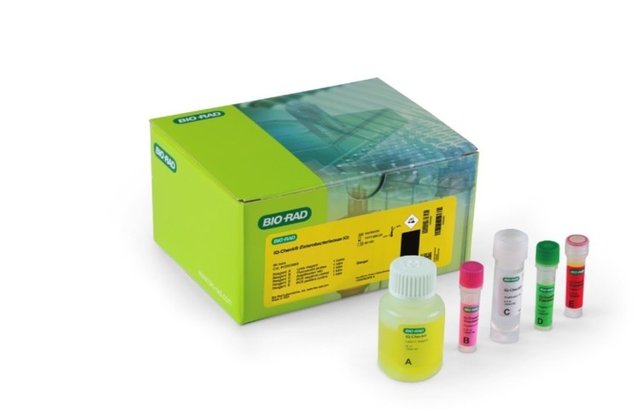Biomedical Reagent Kits Have Simplified and Standardized Lab Protocols, But Are Some Basic Skills Going Extinct?
In the modern biomedical laboratory, reagent kits containing all the necessary ingredients are premixed and supplied ready-to-use including a fresh unopened bottle of sterile deionized water.

Example of a kit by Bio-Rad designed for real-time PCR of fecal bacteria, used, for example, to test food products for contamination.
Kits are available from biotech suppliers for virtually any step or procedure a lab technician might conceivably carry out. Typically the user has to supply only the unknown sample, maybe a few custom ingredients, and a laboratory with the necessary basic equipment and services.
Kits have been prepared by professionals under GMP conditions, tested and guaranteed including a positive control, they allow for lab protocols to be reliably reproduced in different labs, and most obviously they have simplified the process of carrying out the instructions provided. The instructions ensure that different users follow the same Standard Operating Procedure (SOP).
I have been able to take advantage of the simplicity and clearly outlined instructions to train scientists with little or no laboratory experience in biology or biotechnology to perform DNA analysis. For example, I have trained environmental scientists, ecologists, geologists, and law students to extract DNA, splice plasmids, transform E.coli, clone, and sequence, and analyze DNA from water and soil samples they collected in the field. With a kit and simple instructions, almost anyone with basic lab skills can carry out sophisticated procedures.
It simply was unnecessary for them to understand the intricacies of buffer composition, presence of cofactors, ionic strength, concentration of primers or probes, etc. One could learn to follow the instructions, operate basic lab equipment, and get the necessary results and proceed with their analysis.
Unfortunately fewer biomedical scientists using the kits have knowledge of the kit components, their roles, and their constitution. In most cases, technology has advanced to the point that significant progress is being made without the need for lab techs to make all the ingredients from scratch.
This is a good thing in that reproducibility and standardization have improved. But what about the art of making the individual components that go into a pre-mixed kit? This skill will be retained by those who produce the kits, and individuals gifted with the abilities to constitute the buffers, enzymes, cofactors, stabilizers, and other ingredients will be in higher demand.
Will your favorite kits become trade secrets, and the exact chemical composition and mechanism of action kept confidential from the enquiring professional or researcher?
My experience with college students in chemistry and biology makes me somewhat concerned about this lack of basic and fundamental knowledge. Just like it isn't necessary to be an expert in microelectronics to use a cell phone, it isn't necessary for every lab tech to know all the minutia of an immunoassay.
However when my nurse--or doctor--or pharmacist--has to compound or reconstitute a potentially dangerous drug the stakes are more personal: I want to know that they graduated with a clear understanding of moles, molecular weight, molarity, percentage (%w or %v?), and a clear concept of the meticulous kinetics and thermodynamic principles that seemed so irrelevant and intellectual back then as a pre-professional undergraduate!

Good point, I recall learning how to use litmus paper back in high school. I am currently taking a few organic chemistry courses and I have to refer to the periodic table so often, I put an app on the tablet. It's really amazing all the useful information contained in the table. Organic chem puts more emphasis on how molecules interact and the primary elements are hydrogen, oxygen, sulfur, phosphorus and carbon. I need to refer to the periodic table so I know the atoms valance. I am also wondering if the upcoming chemists, pharmacist and doctors are knowledgeable on how basic chemistry works or do they just follow some manual.
I appreciate your support, thank you. Upvoted
Another important property of atoms in organic molecules is the concept of electronegativity. If you understand that electrons are strongly attracted by certain elements (e.g., N, O, Cl, etc.) and easily lost by other elements (e.g., H, Na, Si, Zn, Mg, Ca, etc.), then it helps to predict the properties of a structure and predict how it will react.
Thanks for the link.
How can one forget about electronegativity. Yes I have heard the term many times during my studies. Fluorine being the most electronegative. Another concept is resonance, I understand what it is but I am still learning. I get that it lowers the overall energy level. I had a quiz recently to draw up all the resonance forms of a molecule, I think there were 6 and I could only find 3. I still have some learning to do.
I have an app called "The Elements by Theodore Gray" that really brings the Periodic Table to life...very cool!
The Elements by Theodore Gray by Touch Press Inc
https://itunes.apple.com/us/app/the-elements-by-theodore-gray/id364147847?mt=8
Resteemed your article. This article was resteemed because you are part of the New Steemians project. You can learn more about it here: https://steemit.com/introduceyourself/@gaman/new-steemians-project-launch